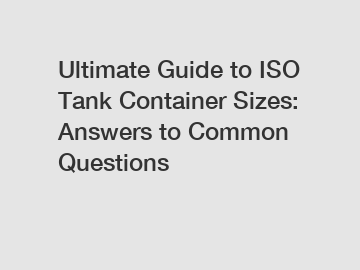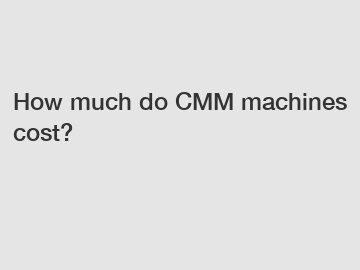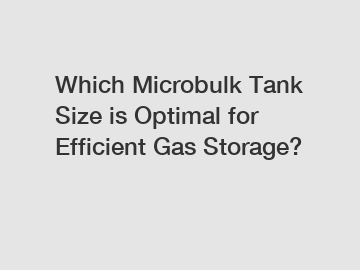Ultimate Guide to ISO Tank Container Sizes: Answers to Common Questions
ISO tank containers are versatile containers that are used for transporting and storing liquids, gases, and powders. They are a popular choice for companies looking to transport bulk liquids and gases in a safe and efficient manner. However, one common challenge that companies face when it comes to ISO tank containers is choosing the right size for their needs. With so many different sizes available, it can be overwhelming to find the perfect fit.
In this ultimate guide to ISO tank container sizes, we will answer some of the most common questions that companies have when it comes to selecting the right container size. Whether you are transporting chemicals, food-grade products, or pharmaceuticals, this guide will help you make an informed decision when it comes to choosing the right ISO tank container size for your needs.
What are the standard sizes of ISO tank containers?

ISO tank containers come in a variety of standard sizes, with the most common sizes being 20ft, 30ft, and 40ft containers. The 20ft container is the most popular choice for companies looking to transport smaller quantities of liquids, while the 30ft and 40ft containers are better suited for larger volumes. It is important to note that these are just the standard sizes, and custom sizes can also be manufactured to meet specific requirements.
What factors should be considered when choosing an ISO tank container size?
When choosing an ISO tank container size, there are several factors that should be taken into consideration. The type of liquid or gas being transported, the volume of product, the distance of transport, and the storage requirements are all important factors to consider when determining the right size. It is also important to consider the compatibility of the container with the product being transported, as well as any regulations or certifications that may apply.
How do I determine the right size ISO tank container for my needs?
To determine the right size ISO tank container for your needs, it is important to first consider the volume of product that needs to be transported. If you are transporting a smaller quantity of product, a 20ft container may be sufficient. However, if you are transporting a larger volume, a 30ft or 40ft container may be more suitable. It is also important to consider the weight and dimensions of the container, as well as any specific requirements for temperature control or product compatibility.
Explore more:What are the advantages of purchasing a Geiger counter?
Which material should you never cut in the laser cutter?
Which products did Caterpillar introduce during the Great Depression?
Environmentally friendly solutions to plastic bottles under the microplastic crisis
Which Manual Stacker with Straddle Legs Provides the Smoothest Operation?
How do you straighten brake tubing?
What is the diameter of a hydraulic cylinder?
What are the benefits of using ISO tank containers?
ISO tank containers offer a number of benefits for companies looking to transport bulk liquids and gases. They are a cost-effective and efficient way to transport large volumes of product, and can be easily moved from one location to another using standard transportation methods. ISO tank containers are also a safe and secure way to transport hazardous materials, as they are designed to meet strict safety standards and regulations.
In addition to their practical benefits, ISO tank containers are also environmentally friendly, as they are reusable and recyclable. This makes them a sustainable choice for companies looking to reduce their carbon footprint and minimize waste. Overall, ISO tank containers offer a reliable and efficient solution for companies looking to transport bulk liquids and gases in a safe and sustainable manner.
What are some common uses for ISO tank containers?
ISO tank containers are used in a wide range of industries for transporting and storing liquids, gases, and powders. Some common uses for ISO tank containers include transporting chemicals, food-grade products, pharmaceuticals, and hazardous materials. They are also used for transporting water, oils, and other bulk liquids, as well as gases such as propane and liquefied natural gas.
In addition to their use in the transportation industry, ISO tank containers are also used for storage purposes. They can be used to store liquids, gases, and powders in a safe and secure manner, and can be easily stored on-site or at a remote location. ISO tank containers are a versatile and flexible solution for companies looking to transport and store bulk liquids and gases in a safe and efficient manner.
In conclusion, ISO tank containers are a versatile and efficient solution for companies looking to transport and store bulk liquids and gases. By considering factors such as the volume of product, the type of liquid or gas being transported, and any specific requirements, companies can choose the right size ISO tank container for their needs. With their practical benefits and environmental advantages, ISO tank containers offer a reliable and sustainable solution for companies looking to transport bulk liquids and gases in a safe and efficient manner.
For more information, please visit Cryogenic Pressure Vessel Design, Microbulk Tank Specifications, Low-Temperature Liquid Oxygen Micro Bulk Storage Tank.
Explore more:Revolutionize Adhesive Application with Efficient Hot Melt Dispensers
Exploring the Vital Role of Blowout Preventers
Which Innovative Features Make the Olvasztótégely Eladó the Perfect Choice for Modern Cooking?
How does fish feed extruder work?
Revolutionary 30-1000LPM Oxygen Generator: Meet Your Medical & Industrial Needs Effortlessly
Who makes sintered porous metal filters?
How do I calculate how much air compressor I need?










